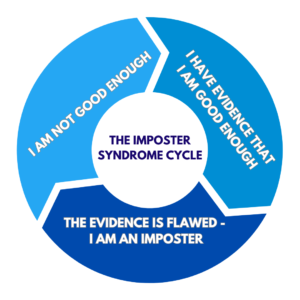Do you agonize over even the smallest mistakes in your work?
Do you attribute your success to luck or external factors?
Do you feel like sooner or later, you will be found out as a phony?
Do you downplay your own expertise, even in areas where you are genuinely more skilled than others?
If you answered yes to any or all of these questions, you might very well be suffering with Imposter Syndrome.
What is Imposter Syndrome?
Imposter syndrome is the internal psychological experience of feeling like a phony in some area of your life, despite any success that you have achieved in that area.
Psychologists Suzanna Imes and Pauline Rose Clance first used this term in a research paper published in 1978 entitled ‘The Imposter Phenomenon in High Achieving Women’.
Imes and Clance found in a sample group of 150 women that, despite their degrees, honours and other high achievements, these women did not feel an internal sense of success – instead they felt like imposters.
In essence, Imposter Syndrome is when competence exceeds confidence.
How does it show up?
according to Imes and Clance, there are three defining characteristics of imposter syndrome:
- the belief that others have an inflated view of your abilities or skills,
- the fear that you'll be found out and exposed as a fake,
- the persistent attribution of success to external factors such as luck or an extraordinary level of hard work.
Research suggests that 70% of us will experience this phenomenon for at least a period in our lives.
And nearly twice as many more women (21%) suffer very frequently or always from imposter syndrome than men (12%) *
Psychologist Dr Sandi Mann in her book, Why Do I Feel Like an Imposter? identifies the women thought to be more at risk as:
- those particularly successful
- those working in male dominated fields.
- those who work in roles traditionally associated with men, e.g., CEO, or Chair.
Imposter syndrome is not classified as a mental illness, which means you're not mentally ill if you experience imposter syndrome.
What causes it?
Imposter Syndrome is closely linked to self-esteem.
Self-esteem is how you see yourself as a whole, rather than specific parts of you. That is, how much approval, acceptance, and worthiness you feel. This can vary in different circumstances.
Self-esteem can be ‘global’ or ‘state’. Global is how you feel overall about yourself. State can vary widely depending on the circumstances at play.
This means that whilst your overall self-esteem might be high, in certain circumstances, like in a new job, or new lifestyle, you might find yourself feeling like a fraud.
Imposter feelings are rooted in a belief that you are unworthy or not good enough.
This is a belief that you have picked up in your formative years. And it is the starting point of the Imposter Syndrome Cycle.

The cycle brings about an inner conflict. ‘I am not good enough’ versus ‘I have evidence that I am good enough’.
It is easier to dismiss the evidence as flawed, since the belief ‘I am not good enough’ has probably been with you a lot longer.
Dismissing the evidence looks and sounds like this:
Black and white thinking – “Either I’m perfect or I’m useless”
Filtering – Overlooking the good stuff and only paying attention to the mistakes
Discounting – “I was lucky, they are just being nice, the task was easy”
This time it’s different – “My previous experience doesn’t count here”
Distorting the evidence – “I know what they said, but this is what they really meant”
What is the impact?
Imposter syndrome can fuel the motivation to achieve, but at the cost of experiencing constant anxiety. Those who suffer might work much harder than necessary, to prove themselves, and ultimately end up with depression.
The problem with imposter syndrome is that the experience of doing well at something does nothing to change your beliefs.
"Imposter syndrome doesn't go away with any form of success." - Australian tech billionaire Mike Cannon-Brookes, "Most days, I still feel like I don't know what I'm doing."
The more you accomplish, the more you just feel like a fraud.
It's as though you can't internalise your experiences of success.
And sadly, people who experience imposter syndrome tend to suffer in silence.
How to combat Imposter feelings.
Remember: Feelings are not FACTS
Feelings are reactions to your thoughts and beliefs, neither of which may be true.
Your beliefs are simply thoughts that you keep thinking. Learning to observe your thinking and be more aware of your negative self talk will help enormously.
Remember: Facts are your friends
Strategies for dealing with Imposter Syndrome:
- Give yourself a reality check: monitor your internal dialogue. Know your objective standards of success. Use the CBT Tool, Catch it, Check it, Change it. Catch the thought. Check it: is that true? Change the thought to a more objective perspective.
- Speak to others Irrational beliefs tend to fester when they are hidden and not talked about. Confide in someone you trust about your feelings. You might be surprised to learn they have Imposter Syndrome too!
- Celebrate your accomplishments Clance and Imes found that the women they studied did not experience an internal sense of success. This is often why high achievers move on to the next thing and the next, constantly searching for validation. To interrupt this pattern, create micro celebrations to acknowledge your achievement, and use these little rituals to feel successful in your body.
- Seek a mentor; be a mentor Having a mentor will enable you to deal with your imposter feelings safely. Being a mentor will enable you to showcase your expertise and help someone else in the process.
The nature of life ensures Imposter Syndrome will inevitably rear its head at times. Change and uncertainty are the biggest triggers. If we know this and have the tools to manage it, we will be able to recognise these familiar feelings and deal with them much more effectively than before.
*Indeed’s Working on Wellbeing 2022 report: https://uk.indeed.com/lead/working-on-wellbeing-2022-report


